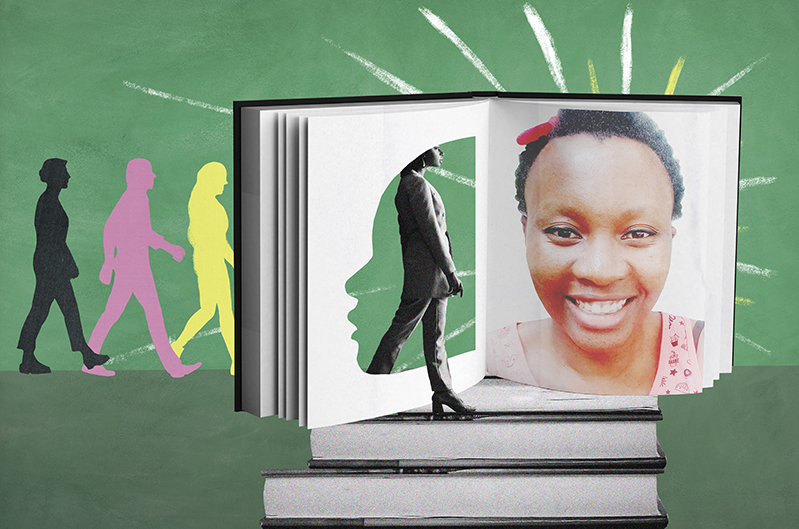I taught my first class at age 7, having sneaked out of my Standard 2 classroom. This was in the early ’90s, during a free period when our teachers were having an emergency meeting in the staffroom. The Standard 1 teacher returned to find me in the act of teaching her tender 6 year olds how to mispronounce the word hello. She kicked me out, of course.
Since then I have been drawn to teaching—mainly, I think, because I am a maven, as defined in Malcolm Gladwell’s The Tipping Point. Gathering, packaging and disseminating information to just the person I know will benefit most from it gives me a very pleasant feeling. Had I been born in Europe or America, I might have ended up teaching primary or secondary school English. One of my big culture shocks at Amherst was encountering students who wanted to teach children after graduation. With a degree from one of the best colleges in the world?
I had come from a country where teaching (outside the tertiary-level) is still the province of those who have few career choices, because they scored poorly in the make-or-break Kenya Certificate of Secondary Education exams. And besides, even without the fear of constant financial want, as a teacher in Kenya I would have faced a curriculum that has no room for innovation or self-expression, and I would now be as bored as a log.
But one cannot run away from oneself. One way or another, I have been a teacher throughout my life. As a child preacher of the tele-evangelical tradition—heavy on Bible verses and timely inflection of tone—I tried to corral souls to the Lord. In school, my grades automatically made me an easy choice for leader whenever there was learning to be done in study groups. At Amherst I ran a fiction-writing club, and upon graduation I taught a fiction writing workshop in Nairobi, thanks to a Davis 100 Projects for Peace fellowship. Later I ran a job-search training startup, built an online training platform known as workstry and became engrossed in instructional design for about a year. In all instances, I failed as a teacher—and spectacularly.

No one wanted to hear about damnation, fire and brimstone, and despite helping fellow students improve their grades, I had almost no real friends in primary and secondary school. Hardly any of the participants in that first fiction workshop I led have talked to me since. And, as you might have already guessed, my startup shut down long before breaking even.
I became convinced I had no ability to teach, and that my personality was unpleasant. Those thoughts hurt massively. The truth was, however, always before me. Back in my sophomore year at Amherst, Professor Rivkin and Professor Woglom (happy retirement!) hired me as a grader for Economics 101 assignments. I took to the job with much gusto, only to have one of them (I don’t remember which) take me aside and ask why I was being so hard in my grading. Never had it occurred to me to be gentle and encouraging, to give partial grades for partially correct answers. Those assignments bled red under my hand because I thought of educating as the rigid, sacred business of pushing learning into people’s heads and getting it in there in the correct, officially sanctioned order. In my formative years, no one had ever been gentle about teaching me, and I had not needed encouragement; I had simply bulldozed through whatever needed learning, whether I liked it or not, and expected everyone else to do the same. That is the Kenyan way.
Then came 2018, my Caine Prize for African Writing win and my decision to launch the Nairobi Fiction Writing Workshop (NF2W). I felt the need to impart all that I had learned in my writing classes at Amherst and New York University to other emerging writers in my country. Creative writing classes are few, far-in-between and very short in Kenya. I desired for Kenyan writers the experience of studying craft intensely over several months and within a supportive community. But there was still the matter of me being a terrible teacher. I walked into my first class of 12 with trepidation. I knew I would mess up—a sharp word, a poor joke, some show of impatience—and no one would show up for the second class.
Reader, I am now teaching my fourth NF2W session! And to my surprise, I am a likeable teacher. Writers even retake my workshops and recommend them to others. How did this happen? I think I grew older and calmer and let go of my need to control. That first class was tense, but I found that I had no desire to push or cajole. It was okay for each of my workshop participants to put in as much or as little effort as he/she/they wanted to. For the first time, I saw myself as a facilitator of learning and not its driver, and I was finally able to help others learn. This morning, I have in my hands for the first time Digital Bedbugs, the 2019 anthology of the Nairobi Fiction Writing Workshop. I could not feel prouder.
Would I be successful at teaching another subject? I don’t know, but for now, fiction has redeemed me.
Onjerika has new short stories in Jalada, Nairobi Noir, Doek!, Waxwing and the summer 2020 issue of Fireside Magazine.
Illustration by Franziska Barczyk